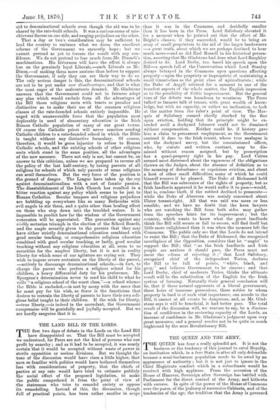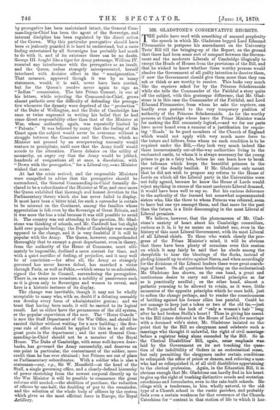THE QUEEN AND THE ARMY,
THE QUEEN has done a really splendid act. It is not the business or the tendency of this journal to extol Royalty, an institution which, in a free State, is after all only defensible because a semi-barbarous population needs to be awed by an appearance of authority ; but it is not just to ignore in the Chief Magistrate conduct which in a subordinate would be received with high applause. From the accession of the House of Hanover, Sovereign after Sovereign has battled with Parliament for the direct control of the Army, and hitherto with success. In spite of the power of the House of Commons over the purse, of the jealousy of successive Cabinets, and of the tendencies of the age, the tradition that the Army is governed. by prerogative has been maintained intact, the General Com- manding-in-Chief has been the agent of the Sovereign, and internal discipline has been regulated by the direct action of the Crown. Why this particular prerogative should have been so jealously guarded it is hard to understand, but a caste feeling entertained by all Sovereigns has probably had much to do with it, and of its existence there can be no doubt. George ILI, fought like a tiger for Army patronage, William IV. resented any interference with the prerogative as an insult, and the Queen, unless strangely misrepresented, herself interfered with decisive effect in the "amalgamation." That measure, approved though it was by so "many statesmen, would, it is said, never have been carried, but for the Queen's resolve never again to sign an "Indian" commission. The late Prince Consort, in one of his letters, while rejecting the Command-in-Chief, grows almost pathetic over the difficulty of defending the preroga- tive whenever the dynasty were deprived of the " protection " of the Duke of Wellington, and the Duke of Cambridge has once or twice expressed in writing his belief that he had some direct responsibility other than that of the Minister at War, whose authority, again, was repeatedly limited by "Patents." It was believed by many that the feeling of the Court upon the subject would never be overcome without a struggle between the Commons and the Crown, which no Minister not pressed by an overpowering necessity would venture to precipitate, until sure that the Army itself would accede to the alteration. Fierce debates on the utility of monarchy, an angry cry that the Army would be jobbed, hundreds of resignations all at once, a dissolution, with "Down with the prerogative," for a Liberal cry,—no Minister wished that scene.
At last the crisis arrived, and the responsible Ministers were compelled to advise that the prerogative should be surrendered, the General Commanding-in-Chief formally de- clared to be a subordinate of the Minister at War, and once more the Queen exhibited that thorough and honest devotion to the Parliamentary theory which she has never, failed to display. It must have been a bitter trial, for such a surrender is certain to be misread on the Continent, among the families whose appreciation is felt even by the Sovereign of Great Britain, and it was none the less a trial because it was still possible to avoid it. The country was not attending to the question, Mr. Glad- stone was thinking of schools, and Mr. Cardwell has but slight hold over popular feeling; the Duke of Cambridge was warmly opposed to the change, and it is very doubtful if it will be popular with the Army. The Queen, however, comprehended thoroughly that to exempt a great department, even in theory, from the authority of the House of Commons, must ulti- mately be impossible, declined a mere contest for time, and with a quiet sacrifice of feeling, of prejudice, and it may well be of conviction—for after all, the Army so strangely governed has never known defeat, has marched a victor through Paris, as well as Pekin,—which seems to us admirable, signed the Order in Council, surrendering the prerogative. There is, on some rare occasions, a nobility of passiveness such as it is given only to Sovereigns and women to reveal, and here is a historic instance of its display.
The change was inevitable, though it may not be wholly acceptable to many who, with us, doubt if a debating assembly can develop every form of administrative genius ; and we trust that having been made, it will be carried to its logical result. Let us either have the permanence of the old system, or the popular supervision of the new. The "Horse Guards" is now the Staff Department of the War Office, and should be carried thither without waiting for a new building ; the five- year rule of office should be applied to this as to all other great posts in the department ; and the next General Com- manding-in-Chief should not be a member of the Royal House. The Duke of Cambridge, with some well-known draw- backs, has governed the Army successfully, and deserves on one point in particular, the contentment of the soldier, more credit than he has ever obtained ; but Princes are out of place as Parliamentary subordinates. With a soldier who is also a statesman—say, e.g., Sir W. Mansfield—at the head of the Staff, a single governing office, and a clearly-defined hierarchy of power stretching from the newest corporal directly up to the War Minister it will be possible to commence the great reforms still needed,—the abolition of purchase, the reduction of officers by one-half, the doubling of pay to the remainder, and the selection of the whole body of officers by the system which gives us the most efficient force in Europe, the Royal Artillery.































 Previous page
Previous page